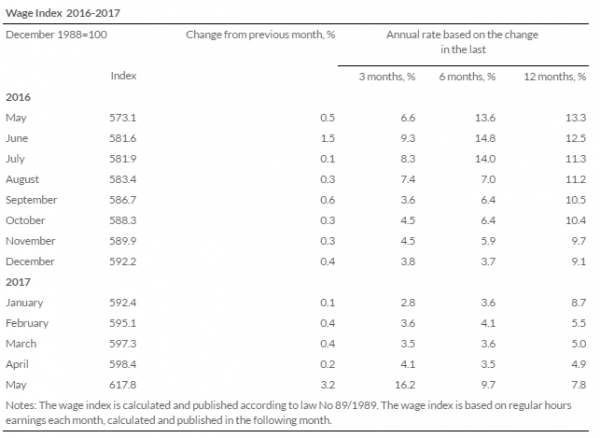The wage index in Iceland has risen by 7.8% in the past 12 months figures from Statistics Iceland reveal. The index rose by 3.2% in May compared to the month before. When the increase in the consumer price index is taken into account the increase in wages translates to a 3% increase in real wages between months. The real wage increase over the past 12 months is 6%.

The major reason for the rising real wages is the low level of inflation in Iceland and general wage agreements between unions and employers. An agreement between the member organizations of Icelandic Confederation of Labour and Confederation of Icelandic Employers stipulated a general wage increase of 4.5% on May 1st 2017.
A second agreement, between Icelandic Financial Services Association and Confederation of Icelandic Employers stipulated a general wage increase of 5.0% on May 2017.
Read more: Report: Icelandic economic growth tops all but one OECD country in 2016: GDP grew 7.2%
Last year Icelandic workers saw an even larger wage increase on May 1st, explaining the 13.3% year-over-year increase in wages in May 2016. The latest figures therefore demonstrate that the pace of real-wage increases is slowing down, but still very strong.

The wage index in Iceland has risen by 7.8% in the past 12 months figures from Statistics Iceland reveal. The index rose by 3.2% in May compared to the month before. When the increase in the consumer price index is taken into account the increase in wages translates to a 3% increase in real wages between months. The real wage increase over the past 12 months is 6%.

The major reason for the rising real wages is the low level of inflation in Iceland and general wage agreements between unions and employers. An agreement between the member organizations of Icelandic Confederation of Labour and Confederation of Icelandic Employers stipulated a general wage increase of 4.5% on May 1st 2017.
A second agreement, between Icelandic Financial Services Association and Confederation of Icelandic Employers stipulated a general wage increase of 5.0% on May 2017.
Read more: Report: Icelandic economic growth tops all but one OECD country in 2016: GDP grew 7.2%
Last year Icelandic workers saw an even larger wage increase on May 1st, explaining the 13.3% year-over-year increase in wages in May 2016. The latest figures therefore demonstrate that the pace of real-wage increases is slowing down, but still very strong.







